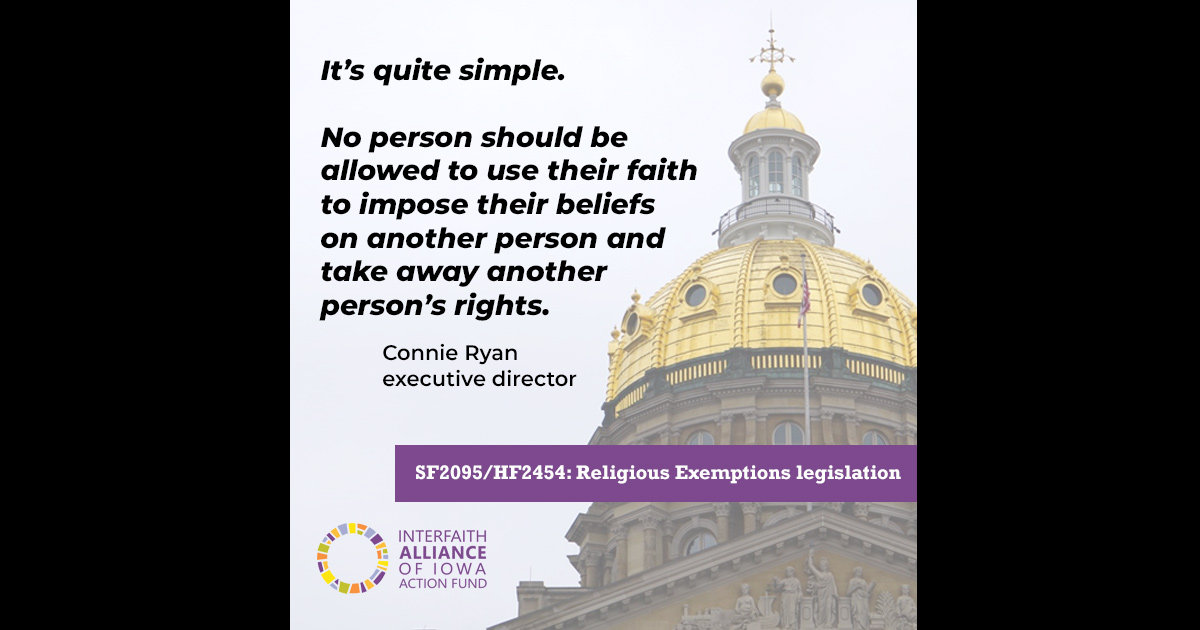Connie Ryan is Executive Director of the Interfaith Alliance of Iowa and Action Fund. She first published a version of this essay in the Des Moines Register.
Religious freedom is one of our country’s most fundamental rights. Religious freedom is also already protected through the First Amendment to the U.S Constitution as well as Article I, Section 3 of our state’s constitution. The rule of law is also important.
Iowa Senate Republicans approved Senate File 2095, known as the religious exemptions law or “Religious Freedom Restoration Act” on February 20. But even some Republicans have major concerns with the legislation.
This proposal would allow people to pick and choose which laws they follow and which they choose to skirt around under the guise of religious freedom. It would also codify discrimination into Iowa law.
The federal Religious Freedom Restoration Act, which Congress approved with bipartisan support in 1993, was designed to protect the people from the government imposing its will on an individual’s religious freedom without a compelling reason. An example often given is the government infringing on the right to perform some type of religious worship, unless there is an important government interest, like public safety.
Activists have twisted that concept over the past two decades so that the infringement of rights is one person to another. Some believe religious freedom is at the top of an imaginary Pyramid of Rights, enshrining its place over all other rights. But the federal law was never intended to place one person’s religious freedom above the rights of another person, or to impose one person’s religious beliefs on another—as has happened in states across the country.
The protection of religious freedom should never provide a privilege for my rights to place a barrier in front of you and your rights, or cause you harm. My rights end at the tip of my nose, as has often been said.
Similar laws in other states are thinly veiled efforts to allow business owners, employers, landlords, and others to discriminate against LGBTQ people. They have also been used to hinder access to contraceptive care, and to justify child abuse and domestic violence. All in the name of religious freedom.
Our state is at a crossroads. Do we believe all people are equal, or not? Do we believe all Iowans are worthy, or do we think some people deserve a second-class citizenship?
Our nation’s history is littered with examples of people’s rights being erased because of religious beliefs and religious freedom. Some used religious beliefs to justify slavery or oppressive Jim Crow laws. Those in the majority have discriminated against Jews and Muslims time and again. Immigrants from an array of countries have faced discrimination couched in religious arguments.
Religious freedom is a bedrock of our nation, but so is equality. Our government and lawmakers have a responsibility to ensure equality and fairness for all, guarding against the misuse of any “right” to harm others.
While we all cherish religious freedom, this sacred right is not without limits. Republicans passed this bill in the Iowa Senate. House Republicans should listen to the still small voice informing their hearts and minds and bury the companion legislation (House File 2454) in a drawer.
It’s quite simple. No person should be allowed to use their faith to impose their beliefs on another person and take away another person’s rights.
All Iowans should have equal access to live, work, shop, and dine and should not face legalized discrimination. The religious freedom of some should not be allowed to create a second-class citizenship for others.
Lawmakers should reject an agenda shrouded with discrimination and justified by a distorted notion of religious freedom. Lawmakers should work diligently to protect all civil rights and ensure all people are treated equally.


2 Comments
there have alway been competing
versions of “freedom” and in politics there will always be winners and losers including in the realm of what counts as a practice of religion or not.
dirkiniowacity Fri 23 Feb 7:41 PM
The Right to Sue the Government - An Exception to Sovereign Immunity
In Burnett v. Smith, 990 N.W.2d 289 (Iowa 2023), the Iowa Supreme Court explained that the Bill of Rights in the Iowa Constitution does not include the right to sue the government for violating them. They only apply when government takes away liberty or property as a response rather than a preemption. I’m not comfortable with that. I think the Iowa Supreme Court should be an equal branch when it comes to interpreting the Iowa Constitution and reviewing legislation. So, here comes a couple of bills allowing citizens to sue the government for half of Article 1, Section 3. All I can say is half a right is better than no rights at all. But, it does seem strange you can’t sue the state for establishing a religion, due process, equal protection, privileges and immunities, and uniform operation of the laws, to name a few.
carl Sat 24 Feb 11:28 AM